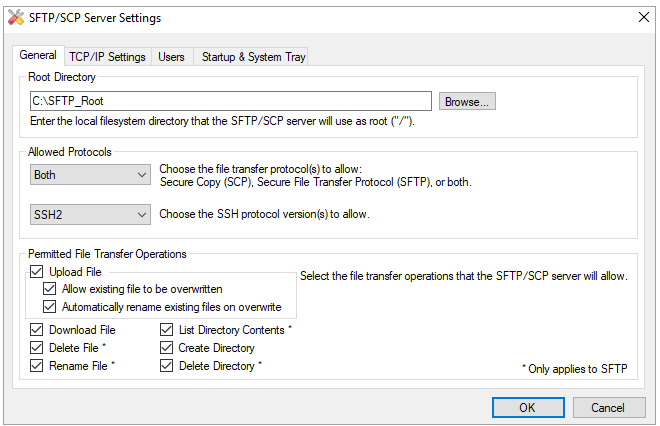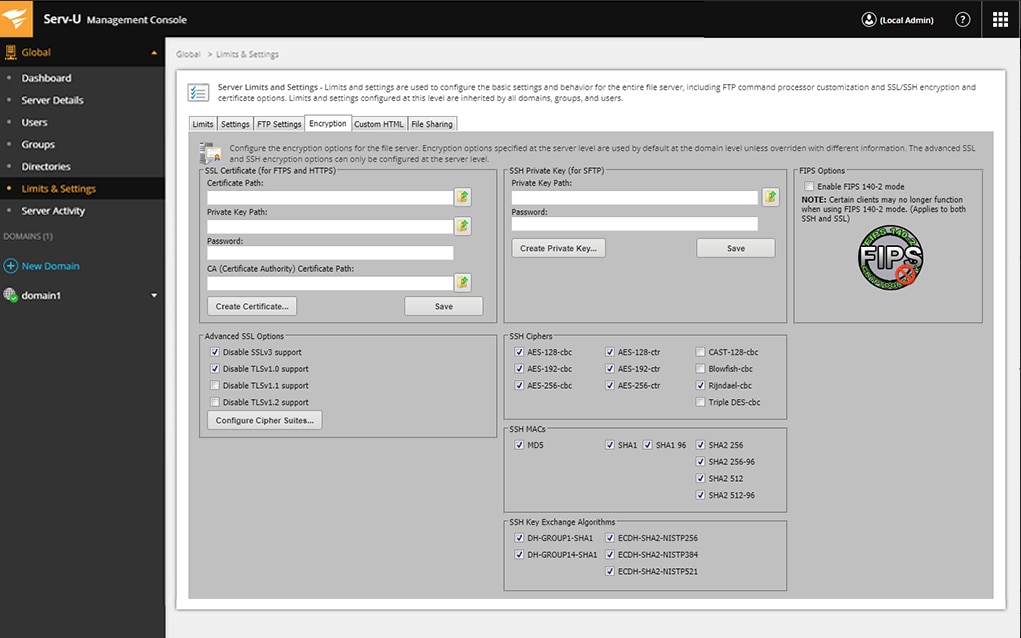Secure File Transfer Protocol (SFTP), also known as SSH File Transfer Protocol, is a robust, encrypted method for transferring files across networks, designed as a more secure alternative to traditional File Transfer Protocol (FTP). Essential for industries handling sensitive data—like finance and healthcare—SFTP protects against unauthorized access and enables efficient file management, making it a critical tool for remote access and data protection.
Choosing the correct SFTP server is critical for businesses looking to streamline secure transfers, support regulatory compliance, and scale as they grow. The best servers typically offer reliability, user controls, integration options, and more. This guide explains how SFTP works and why it’s an essential choice over FTP. We’ll also explore the SFTP servers scene, covering premium and free options, to help you find the best fit for your needs.
- What Is an SFTP Server?
- SFTP vs. FTP: Key Differences
- Benefits of Using SFTP for File Transfers
- Top SFTP Server Solutions
- Key Features to Look for in SFTP Servers
- Troubleshooting Common SFTP Server Issues
- Future of SFTP Servers
- Finding the Best SFTP Server
What Is an SFTP Server?
To choose the best SFTP server, you must understand how SFTP works, what sets it apart from other protocols, and why it’s become the preferred choice for secure file transfers. An SFTP server is a secure file transfer solution that enables organizations to transmit data safely between local computers and remote servers. Using the Secure Shell Protocol (SSH), SFTP encrypts both the connection and the files being transferred, helping ensure data protection and supporting regulatory compliance—ideal for sensitive information in sectors like finance, healthcare, and legal.
Beyond basic file transfers, SFTP servers often offer advanced file management. Users can upload, download, modify files, set permissions, and perform batch transfers remotely. This functionality supports secure collaboration with partners, vendors, and remote employees, making SFTP servers invaluable for businesses with distributed teams. Additionally, SFTP servers are commonly used for cloud storage and automated backups, so critical files are securely stored and accessible in case of local system failures, preserving data integrity with minimal manual effort.
SFTP vs. FTP: Key Differences
FTP and SFTP are protocols for transferring files over a network, but they differ significantly in terms of security and functionality. FTP, developed in the 1970s, was revolutionary for enabling fast and accessible file sharing, but its lack of encryption makes it less suitable for today’s security-focused environment. SFTP, on the other hand, was designed with modern data protection in mind, adding layers of encryption and authentication to safeguard sensitive information. Here’s a closer look at the key differences between FTP and SFTP:
Security:
- FTP: Transmits data in plain text, making it vulnerable to interception. Malicious actors can easily access unencrypted data during network sniffing or breaches.
- SFTP: This protocol uses SSH to encrypt data in transit with algorithms like AES, 3DES, and Blowfish. It encrypts commands and performs integrity checks on transferred data to prevent manipulation.
Authentication:
- FTP: Requires only a username and password, offering limited security.
- SFTP: Provides enhanced security using SSH keys and host-based authentication to verify server identities and prevent unauthorized access.
File Management:
- Both FTP and SFTP support file management functions, such as uploading, downloading, and setting transfer modes (ASCII or binary), though SFTP offers these capabilities with added security.
Speed:
- FTP: It is generally faster due to the lack of encryption, making it suitable for large or bulk file transfers when security isn’t a primary concern.
- SFTP: It is slightly slower due to encryption layers, but the added security is often worth the tradeoff for organizations handling sensitive data.
Benefits of Using SFTP for File Transfers
Many organizations turn to SFTP for their file transfer needs, with good reason. When using SFTP for file transfers, businesses can take advantage of:
- Efficient Transfers for Large Files: While not the fastest protocol, SFTP handles large file transfers well with built-in compression. It reduces file sizes during transfer to speed up the process and conserve bandwidth.
- Comprehensive Logging: SFTP generates detailed logs, making it easy for organizations to track file transfer activities, which is especially useful for audits and helping demonstrate regulatory compliance.
- Single-Port Operation: SFTP simplifies network and firewall configurations using a single port (typically port 22) for data and command channels.
- Robust User Authentication: SFTP offers strong authentication through SSH keys and two-factor authentication, reducing the risk of unauthorized access to sensitive files.
- Integrity Checks: SFTP uses hash functions to provide integrity checks on transferred data. These checks help ensure that any transmitted data is still intact and untouched by malicious actors.
- File Transfer Resume Functionality: SFTP supports resuming interrupted transfers, allowing files to continue transferring from where they left off, which is especially valuable for large files on unstable networks.
Top SFTP Server Solutions
Open-Source Options
For those on a tight budget, there are many open-source SFTP server solutions to choose from, including OpenSSH, ProFTPD, and vsftpd.
1. OpenSSH

Created by developers of the OpenBDSD Project, OpenSSH is a powerful connectivity tool for users needing remote login capabilities with the SSH protocol. It’s an open-source SSH server with an SFTP server add-on that allows you to use it as an SFTP server.
Pros:
- Offers Several Authentication Methods: OpenSSH supports multiple authentication methods, such as password, public key, and multifactor authentication.
- Compatible With Many Operating Systems: Whether you have Windows, Linux, or MacOS, OpenSSH will be compatible with your operating system.
Cons:
- No Graphical User Interface: Users unfamiliar with how to use command-line interfaces may find a learning curve when using OpenSSH.
- Requires Manual Key Management: Since OpenSSH relies on SSH keys, users must manage public keys carefully, which can be difficult and time-consuming.
2. ProFTPD
ProFTPD, or Pro FTP daemon, is compatible with Microsoft Windows and Unix systems and offers many features.
Pros:
- Extensive Configuration Options: ProFTPD offers many configuration options that others don’t, enabling customization for diverse needs.
- Robust Logging and Shadow Password Suite Support: With comprehensive logging capabilities, ProFTPD supports shadow passwords, enhancing security by accommodating expired account management.
- Scalable: Thanks to its modular design, ProFTPD can be tailored to different environments, from small setups to large enterprise environments.
Cons:
- No Graphical User Interface: Like OpenSSH, ProFTPD only has a command-line interface.
- Complex Initial Configuration: Due to its extensive configuration options, ProFTPD can require a more complex initial setup and may need careful adjustment to meet specific security and performance needs.
3. Vsftpd
Vsftpd, also known as Very Secure FTP Daemon, is another one of the best free SFTP servers. It’s a lightweight, secure FTP server that can be used in Unix environments.
Pros:
- Secure: Vsftpd is designed with a strong emphasis on security, making it resistant to common vulnerabilities and attacks.
- Fast and Lightweight: With a minimal footprint and optimized performance, Vsftpd is well-suited for high-traffic servers, handling file transfers efficiently without consuming excessive resources.
Cons:
- No Native Support for Windows: Vsftpd is primarily designed for Unix systems and does not natively support Windows environments.
- Basic Features: While secure and reliable, Vsftpd lacks advanced features in some commercial SFTP servers.
Commercial Solutions
For businesses ready to invest in enhanced functionality, plenty of commercial SFTP software options are available.
1. SolarWinds SFTP/SCP Server

SolarWinds® SFTP/SCP Server is an SFTP server for Windows and a Secure Copy Protocol (SCP) server.
Pros:
- User-Friendly Interface: The intuitive interface makes it easy for users to manage file transfers efficiently.
- Supports Large File Transfers: It can handle files up to 4GB, making it suitable for most large data transfer needs.
- SCP Support: In addition to SFTP, SolarWinds also supports SCP file transfers, allowing for versatile, secure data transfers.
Cons:
- File Size Limit: Transfers are capped at 4GB, which may not be sufficient for some large data files.
- Windows-Only Compatibility: It is only compatible with Windows, limiting cross-platform functionality.
For organizations with large files or in need of more advanced data encryption, SolarWinds also has SolarWinds Serv-U® MFT, which supports FTP, FTPS, SFTP, and HTTP/S protocols for file transfer over IPv4 and IPv6 networks and can transfer files of any size.

2. Bitvise SSH Server
Bitvise SSH Server is another strong contender for the best SFTP server for Windows. It offers a free trial version and several pricing tiers suitable for organizations of all sizes.
Pros:
- Offers Several Servers: Besides providing an SFTP server, Bitvise has SCP, FTP, and SSH servers.
- Extensive Security Features: Not only does Bitvise use encryption to secure file content and support HIPAA, PCI, and FIPS 140-2 compliance , but it also has two-factor authentication.
- Enables Remote-Based Access: You can access Bitvise SSH Server remotely using a tool like WinVNC.
- Easy Installation and Usage: Installing, configuring, and using Bitvise SSH Server is fast and easy.
Cons:
- No Native Mobile Support: Bitvise lacks native mobile app support, limiting accessibility for users who need to manage or transfer files on the go.
- Only Supports Windows: Bitvise SSH Server only supports server and desktop versions of Windows.
3. Cerberus FTP Server
Cerberus FTP Server is a secure that can help your organization quickly and securely transfer files.
Pros:
- Supports Many Protocols: Cerberus FTP Server is compatible with SFTP, FTP, FTPS, HTTP/S, and SCP.
- Has Cloud Integrations: Thanks to its compatibility with Microsoft Azure and Amazon Web Service (AWS), you can host your Cerberus FTP Server in the cloud.
- Different Plans: Cerberus FTP Server offers three editions (Professional, Enterprise, and Enterprise Plus), so you can find the perfect solution for your organization.
Cons:
- Higher Cost for Advanced Plans: The more robust features are only available in the Enterprise and Enterprise Plus editions, which may be cost-prohibitive for smaller organizations.
- Limited Platform Support: Cerberus FTP Server is primarily designed for Windows, with limited options for other operating systems.
Cloud-Based SFTP Services
Organizations seeking scalable, flexible file transfer solutions can consider cloud-based SFTP services. Unlike on-premises options, these solutions eliminate the need for local hardware, offering on-demand storage and remote access. Popular cloud-based SFTP services include:
1. AWS Transfer for SFTP
AWS Transfer for SFTP is a secure SFTP service that integrates with Amazon S3.
Pros:
- Integrates With Amazon S3: AWS Transfer for SFTP is part of the AWS Transfer Family and can integrate with Amazon Simple Storage Service (Amazon S3).
- Compliance-Friendly
- Easy to Scale: AWS Transfer for SFTP can automatically handle thousands of concurrent users.
Cons:
- AWS Dependency: AWS Transfer for SFTP thrives within the AWS ecosystem but may not perform as well for organizations using a multi-cloud approach.
- Less Customization: AWS Transfer for SFTP offers fewer customization opportunities as a managed service.
2. Azure Blob Storage
Azure Blob Storage now supports SFTP, meaning users can securely move files to Azure via SFTP.
Pros:
- Easy to Use: It only takes one click to start using an SFTP endpoint with your Azure Blob Storage account.
- Integrated With the Azure Ecosystem: This is an excellent option for users already operating within the Azure ecosystem.
- Scalable: Azure Storage SFTP can scale with your data needs to keep up with your business.
Cons:
- Requires Specific Storage Account: SFTP on Azure Blob Storage requires a standard general-purpose v2 or premium block blob storage account.
- Potentially High Costs: Enabling the SFTP endpoint costs between $0.002 and $0.15 per GB, which can become costly for organizations needing continuous, 24/7 SFTP connections.
Key Features to Look for in SFTP Servers
When selecting an SFTP server, prioritize these essential features:
- Strong Security Measures: Use robust encryption, secure protocols (like FIPS 140-2 and AES), SSH keys, two-factor authentication, and host-based authentication for added protection.
- Ease of Use: Choose an intuitive, user-friendly interface to minimize training time and reduce errors.
- Scalability and Performance: Ensure the server can handle growing data volumes and multiple connections without sacrificing speed or reliability.
- Integration Capabilities: Opt for servers that integrate smoothly with existing systems like cloud storage, ERP, or CRM to streamline workflows and automate file transfers.
- Regulatory Compliance: Select an SFTP server that supports compliance protocols such as HIPAA and GDPR to mitigate security risks.
Troubleshooting Common SFTP Server Issues
When managing an SFTP server, it’s essential to be prepared for common issues, such as:
- Connection Problems: Network interruptions, incorrect IP settings, or firewall restrictions are common causes of connection issues. Ensure network configurations are correct and that the appropriate ports (usually port 22) are open. Reviewing server and client logs can also help identify specific errors.
- Performance Bottlenecks: High data volumes or multiple concurrent connections may lead to slow transfers or dropped connections. To optimize performance, consider adjusting CPU and memory allocation, enabling file compression, limiting simultaneous connections, or using load balancing.
- Security Vulnerabilities: Update server software regularly to address potential vulnerabilities and use robust authentication methods like SSH keys or multifactor authentication. Routine security audits are also essential to identify and address weaknesses in the server setup.
Future of SFTP Servers
The future of SFTP servers is promising, with advancements in automation, speed, and compliance driving more streamlined workflows and faster file sharing. AI and machine learning are expected to enhance predictive monitoring and anomaly detection, enabling proactive threat identification and data optimization.
As more organizations shift to hybrid or cloud-based infrastructures, SFTP solutions will likely integrate seamlessly with cloud providers like AWS, Google Cloud, and Azure. APIs will also offer greater flexibility by enabling direct application interaction, automating file transfers, and integrating with ERP and CRM systems. Encryption and security protocols will advance, with SFTP servers adopting more robust encryption algorithms and standards like FIPS 140-3 to counter sophisticated cyber threats. Features like multi-factor authentication, IP whitelisting, and regular updates will reinforce SFTP servers as essential tools for secure data management.
Finding the Best SFTP Server
The correct SFTP server is crucial for secure, efficient, and scalable file management. With many options available, evaluating security features, integration capabilities, scalability, and ease of use is essential to meet your organization’s specific needs.
In our opinion, SolarWinds offers some of the best SFTP solutions, whether seeking an accessible server, a robust Windows-compatible option, or a more advanced solution for organizations. SolarWinds SFTP/SCPS Server is a free tool with the core SolarWinds SFTP Server technology. It offers advanced security settings, supports files up to 4GB, and can upload and download images from several network devices simultaneously.


